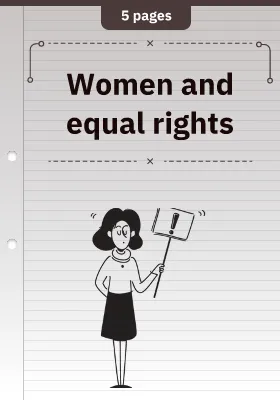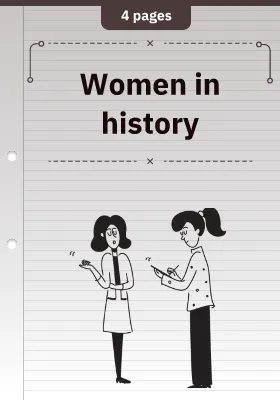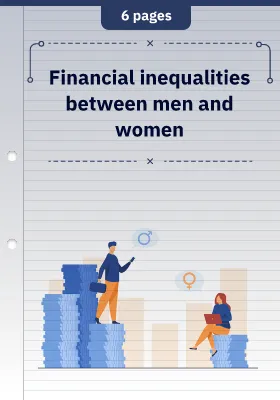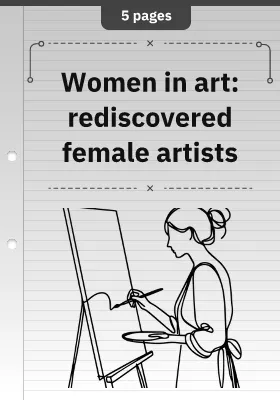
Women and equal rights
This worksheet highlights the historical and current situation of women's rights and equality. It addresses discrimination and injustices faced by women, particularly in science and research, and encourages reflection on the importance of equality in today's society.
Content and methods: The worksheet begins with a general introduction to the relevance of women's rights and the historical disregard for female achievements. An audio file provides insights into the current situation regarding equality in a selected country. Multiple-choice questions test students' understanding of these current issues. At the heart of the worksheet are three case studies of female scientists (Lise Meitner, Rosalind Franklin, Jocelyn Bell Burnell) who did not receive the recognition they deserved despite their groundbreaking discoveries. Texts written in the first person describe their experiences with ignorance and discrimination. A writing assignment asks students to describe the similarities between these injustices and draw parallels to their own lives or school, as well as to suggest possible courses of action. An additional assignment with a video explores the topic of equality in Germany in greater depth, including the role of the Basic Law and important milestones.
Skills:
- Historical awareness: Students recognize historical inequalities and discrimination against women, especially in science.
- Critical thinking: They analyze the causes of injustices and reflect on their impact on individual careers and social structures.
- Empathy and perspective change: Through the reports of female scientists and the audio file, they gain insight into the experiences of women.
- Transfer and problem solving: They apply historical injustices to current contexts and develop their own strategies for promoting equality.
Target group and level: 7th/8th grade

Women in history
Learners explore the role of women in a chosen period and develop an understanding of the successes and challenges faced by women in that period.
Content and methodology: Through text analysis, learners learn more about the living conditions of women in a chosen period. Subsequently, two role cards introduce women of the period and highlight their successes, challenges, and role in history. The results are recorded in a table. As a bonus task, a video from “Terra-X” with accompanying questions on the topic of misinterpretations of history is included.
Skills:
- Strengthening reading skills
- Recognizing the possibilities and limitations of individual and collective action in historical situations
- Reconstructing historical facts (reconstruction)
Target group and level: 7th - 8th grade
Women in the museum: gender inequality in art
Students examine the inequalities between men and women in the art world. They analyze historical and current data on the representation of female artists in museums, reflect on the causes of these inequalities and develop creative approaches to draw attention to the problem.
Content and methods:
This worksheet sheds light on the unequal visibility and appreciation of female artists in museums and on the art market. Examples such as the “Guerilla Girls” and their provocative criticism of sexist structures are used to raise awareness of gender discrimination. Students research current data, engage with artistic activism and develop their own creative forms of expression on the topic.
Competencies:
- Analysis of gender inequalities in the art world
- Critical examination of historical and current data on the representation of women in museums
- Reflection on social structures and their influence on the art world
- Promotion of creative forms of expression through the development of own artistic concepts to address gender inequalities
Target group and level:
Grade 10 and above

Financial inequalities between men and women
Students will explore the financial disparities between men and women, analyze the root causes, and evaluate their societal and economic impact. Through critical reflection and discussion, they will propose measures to promote financial equality.
Content and Methods: This worksheet introduces the concepts of different gender inequalities, highlighting key statistics and structural reasons behind financial inequality. By engaging with data analysis, reading comprehension, and reflective writing tasks, they will develop a deeper understanding of the issue and propose individual, social, and political solutions.
Competencies:
- Analyze financial inequality using real-world data
- Identify and explain systemic barriers to gender financial equality
- Develop critical thinking and problem-solving skills by proposing concrete solutions
- Reflect on the societal impact of economic disparities
Target Group and Level:
Grade 10 and above

Women in art: rediscovered female artists
Objectives:
The learners examine the role of women in art history and reflect on why many female artists were overlooked or forgotten for a long time. Learners analyze and question the structures that have delayed the recognition of various women artists.
Content and methods:
The worksheet introduces the life and work of a female artist and shows why she was only recognized late despite her innovative works. Learners examine historical and social reasons for the marginalization of female artists and reflect on how the art world could change if women had received equal visibility and support from the outset. Through image analysis, expert statements and reflection questions, a critical examination of gender roles in art is encouraged.
Competencies:
- Analysis and interpretation of works of art in a historical and social context
- Critical reflection on structural inequalities in the art world
- Development of own questions on the representation of women in art history
Target group and level:
Grade 10 and above

Male Gaze
Objectives:
Students will explore the concept of the male gaze and reflect on how this view shapes the representation of women in art and visual media. They analyze examples in order to understand and critically question the social implications.
Content and methodology:
The worksheet conveys the origins of the male gaze using a media form such as classical painting and shows how this concept continues to have an impact today. Learners examine the characteristics of male gaze and apply their knowledge in analysis tasks. With the help of examples and reflection questions, they critically examine gender roles and media representation.
Competencies:
- Analysis and interpretation of visual media and works of art
- Critical reflection on social norms and gender roles
- Consciously recognizing and questioning media perspectives
Target group and level:
Grade 10 and above
